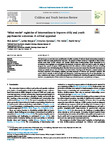"What works" registries of interventions to improve child and youth psychosocial outcomes: a critical appraisal
| dc.contributor.author | Axford, Nick | |
| dc.contributor.author | Morpeth, L | |
| dc.contributor.author | Bjornstad, G | |
| dc.contributor.author | Hobbs, T | |
| dc.contributor.author | Berry, V | |
| dc.date.accessioned | 2022-06-15T19:30:39Z | |
| dc.date.issued | 2022-06 | |
| dc.identifier.issn | 0190-7409 | |
| dc.identifier.other | 106469 | |
| dc.identifier.uri | http://hdl.handle.net/10026.1/19310 | |
| dc.description.abstract |
The last decade or more has seen a proliferation of online registries of evidence-based interventions designed to improve child and youth psychosocial outcomes. The purpose of these resources is typically to help decision-makers make sense of the evidence and thereby inform their decision-making about investment in interventions. Most registries are underpinned by standards of evidence, which are used to guide the rating of programs by a panel of experts. While supporters extol the influence of these initiatives in terms of making commissioners more discriminating about what they invest in, detractors contend that they stifle innovation and embody an unduly narrow view of evidence and intervention. Drawing on the literature, original analysis and first-hand experience of developing, applying and using standards of evidence and associated registries, this article reflects critically on their strengths and limitations, considering issues such as focus, functionality, content, consistency and impact. It also makes proposals for developing and extending the approach, focusing on its intrinsic conceptualization of intervention development, evaluation practice and pathways to impact. | |
| dc.language.iso | en | |
| dc.publisher | Elsevier | |
| dc.title | "What works" registries of interventions to improve child and youth psychosocial outcomes: a critical appraisal | |
| dc.type | journal-article | |
| plymouth.volume | 137 | |
| plymouth.journal | Children and Youth Services Review | |
| dc.identifier.doi | 10.1016/j.childyouth.2022.106469 | |
| plymouth.organisational-group | /Plymouth | |
| plymouth.organisational-group | /Plymouth/Faculty of Health | |
| plymouth.organisational-group | /Plymouth/Faculty of Health/Peninsula Medical School | |
| plymouth.organisational-group | /Plymouth/REF 2021 Researchers by UoA | |
| plymouth.organisational-group | /Plymouth/REF 2021 Researchers by UoA/UoA03 Allied Health Professions, Dentistry, Nursing and Pharmacy | |
| plymouth.organisational-group | /Plymouth/Research Groups | |
| plymouth.organisational-group | /Plymouth/Research Groups/FoH - Community and Primary Care | |
| plymouth.organisational-group | /Plymouth/Research Groups/Plymouth Institute of Health and Care Research (PIHR) | |
| plymouth.organisational-group | /Plymouth/Users by role | |
| plymouth.organisational-group | /Plymouth/Users by role/Academics | |
| dcterms.dateAccepted | 2022-03-12 | |
| dc.rights.embargodate | 2022-6-17 | |
| dc.rights.embargoperiod | Not known | |
| rioxxterms.versionofrecord | 10.1016/j.childyouth.2022.106469 | |
| rioxxterms.licenseref.uri | http://www.rioxx.net/licenses/all-rights-reserved | |
| rioxxterms.type | Journal Article/Review |


